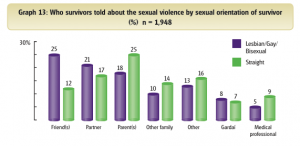A new report from the Rape Crisis Network Ireland gives insights into LGBT survivors of sexual violence in Ireland
In a recently released report on LGBT survivors of sexual violence in Ireland, Rape Crisis Network Ireland (RCNI), GLEN and Gay Switchboard Ireland reveal that there are some significant differences between heterosexual survivors and their LGBT counterparts.
The report goes into findings about various topics including: Sexual orientation of survivors; Gender of survivors; When the sexual violence took place; Incidents of sexual violence; Type of sexual violence; Additional forms of violence; Duration of sexual violence; Location of sexual violence; Telling someone for the first time; Referrals; and reporting to a formal authority.
Findings
Of the respondents in the study, 96% of people identified as heterosexual, whereas 4% identified as either Lesbian, Gay or Bisexual (LGB).
Some of the report’s findings are similar between LGBT and heterosexual people: “Many of these sexual violence experiences disclosed by survivors who identified as LGB were similar to those disclosed by survivors who identified as heterosexual.”
When it came to the gender of the perpetrator, previous research had shown that “lesbian, gay and bisexual survivors of sexual violence disclose higher levels of sexual violence perpetrated by someone of the same sex as them than heterosexual.”
From this study, the RCNI concluded that “LGB survivors attending Rape Crisis Centres (RCCs) disclosed lower levels of sexual violence perpetrated solely by males compared with heterosexual survivors (88% compared with 97%).”
Similarly, the relationship between survivors and perpetrators remained largely the same whether heterosexual or LGB.
Differences
However, within certain areas the responses of LGB people were markedly different to those of people who identify as heterosexual.
Gay and Bisexual males disclosed almost twice the levels of rape when compared with heterosexual males (63% compared to 34%).
One of the biggest differences between LGB and heterosexual people is who the survivors told about the sexual violence they experienced.
“The largest difference between LGB survivors and heterosexual survivors we can see in terms of disclosure is in the high level of trust placed i friends.” with LGB people more than twice as likely to confide in friends than if they were heterosexual (25% confided in friends, compared with 12% of heterosexual respondents).

Another major difference is the time it took for LGB people to report the incident to a formal authority, with 47% of LGB people reporting over ten years after the abuse, compared to 22% of straight people.
Recommendations
The RCNI recommend increasing awareness of sexual violence against the LGBT community by engaging with them and by having LGBT members of the community leading these measures.
They also recommend further research in isolation, barriers to disclosure and appropriate responses to help enhance the understanding of LGBT specific vulnerabilities.
The full report can be downloaded here.
There will be a discussion today, Monday 11 July, at 6:30pm at The Old Chocolate Factory, Kings Inn Street, Dublin 1 to discuss sexual violence and domestic abuse within the LGBT community which is open to everyone to attend.
© 2016 GCN (Gay Community News). All rights reserved.
